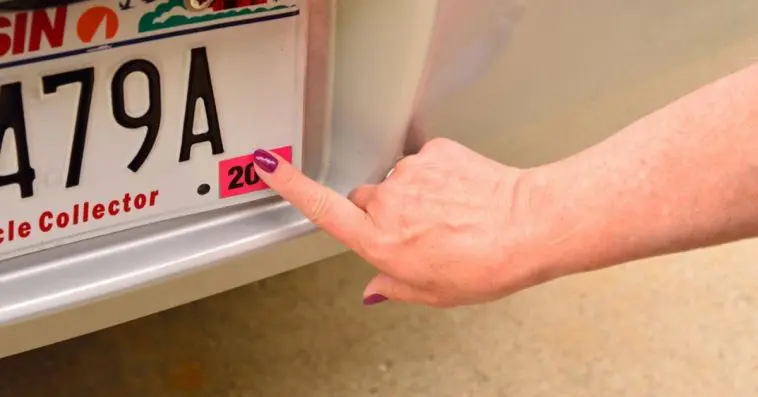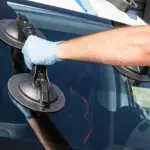Did you know that New York was the first state to make license plates mandatory?
It was back in 1901, and they had homemade license plates then. Coming to the present, license plates have become a norm everywhere in the world.
Every car you purchase has to have a license plate, but the question often asked is, Can I use my old license plate on my new car?
Yes! I can use my old license plate on my new car. It rings true as long as I am the owner of the new one as well.
But if my car is leased, I don’t get to use my old license plate since I am not the owner of the vehicle.
While most states allow the owners to transfer the plate, not all states allow that.
Few states like Alaska and California require the plates to be with the vehicle upon sale unless they are specialty plates.
Under those circumstances, the plates are transferred to the owner.
The interpretation differs from state to state, and there are exceptions everywhere.
Furthermore, it is better for me to contact the DMV and get all the information before proceeding.
TABLE OF CONTENTS
Transferring My Old License Plate To My New Car
The Department of Motor Vehicles (DMV) (which is an agency governed by the state) issues the vehicle registration plate, otherwise called the license plate.
The DMV requires the owner of the car to renew his/her registration every year and issues a new sticker, which is then displayed on the license plate.
Most states associate the number plates to their owner, and while is a few others, it comes with the vehicle.
When I buy a new car, I can transfer my old plate to my new car on the condition that I am the registered owner of both these vehicles.
Also, the license plate should be under my name and not registered to the car. In the case of the former, I can easily transfer it to my new car after the necessary formalities.
But, if my state registers the plate to the car, I would have to surrender the plate, or it can also remain with the vehicle.
The above also depends on the state. In any case, transferring the plate is cheaper than applying for a new one.
What if I own a personalized plate?
In that instance, states usually allow the owner to carry it to the new vehicle.
And that is a better option since it is going to cost me more to purchase a new personalized license plate.
Imagine the stress and work going into changing the license plate details in every relevant document.
Does My State Allow A Transfer?
Not all states have the same rules when it comes to the transfer of plates from an old car to another.
While few make it easy and straightforward, some require you to purchase a new license plate with each vehicle.
Here is a glimpse of the process in every state.
| State: | Detail: |
| Alabama | As long as the taxes are up-to-date, I can transfer the plate to my new car, provided that I have proper approval and pay my fees. |
| Alaska | Plates go with the car unless they are specialty plates. |
| Arkansas | I can retain the plates else, return them. |
| Arizona | Unless it is a specialized one, I cannot transfer a plate. |
| California | Retain the plate and transfer it to a new car after paying transfer fees. |
| Colorado | Plates stay with the owner. I can use it on another car after paying the fee. |
| Connecticut | If transferring a plate after a sale, I can do so else I have to return it to the Commissioner’s Office. |
| Delaware | Plates go with the car if within Delaware. If not, return it to the DMV. |
| District of Columbia | I can either transfer or surrender the plates. If specialty plates, I can transfer it to my spouse. |
| Florida | License plates belong to me. On the sale of the car, the plates are passed on to my new car or return it to DMV. |
| Georgia | Plates stay with me, and with permission, I can transfer it to a new car. |
| Hawaii | Unless I specially request for a transfer of plate, it goes with the vehicle. |
| Idaho | License plates go with me, and to any other vehicle, I may buy. |
| Illinois | Upon paying the transfer fee, I can use my license plate on a new car or return it to the Secretary of State. |
| Indiana | Keep an unexpired license plate and transfer to a new car for a fee. |
| Iowa | The plates belong to the owner. Upon sale, I can hold it and use it on another vehicle within 30 days. |
| Kansas | Hold on to the plate and registration. I can use it on my new one. |
| Kentucky | The plate goes with the car. If selling to an out-of-state customer, return it to DMV. The personalized plate has to be returned. The county clerk re-issues the same if requested. |
| Louisiana | Destroy the plates when selling the car and inform DMV. Specialty plates can remain with the seller. |
| Maine | Unless requested for a transfer, the plate expires when sold. |
| Maryland | Plates go with me provided I request for a transfer. If not, they expire. |
| Massachusetts | Transfer the plates to the new car within seven days. |
| Michigan | Unless it is a relative, the plate stays with me. I can use it on a new vehicle upon approval from the Secretary of State. |
| Minnesota | The plate goes with the new to the new owner unless it is a specialty plate. |
| Mississippi | Dismantle the plate upon selling and let the DMV know about the sale. |
| Missouri | On paying a small fee, the DMV transfers the plate to a new vehicle when I sell the old one. |
| Montana | Transfer the plate to a new car. Either before selling it, or after selling, but within 20 days of buying the new car. |
| Nebraska | Except for specialty plates, the regular plates do not transfer. |
| Nevada | Keep the plate after the sale and transfer to a new vehicle within 30 days. |
| New Hampshire | Take the plate to a new car under your name. |
| New Jersey | I can either use my plate on a new car or surrender to the DMV. |
| New Mexico | The license plate stays with me, and I have 30 days to transfer or surrender the plate. |
| New York | On the sale of my car, I can remove the plate and use it on a vehicle in my name. |
| North Carolina | I can transfer the old plate to my new car as long as it is in the same class as the one in the registration papers. If not, I have to surrender the plate. |
| North Dakota | After selling my car, I can pass on the license plate to the new one since it is associated with my name. |
| Ohio | After the sale of the car, the registration expires, unless I as the owner apply for a transfer of the plates. |
| Oklahoma | Assuming that I am the owner of the new vehicle, I can transfer the plate without any issues. |
| Oregon | The time leftover in my registration and the plates are transferred to my new car. |
| Pennsylvania | The law allows me to retain the plate as long as the new car is the same type. |
| Rhode Island | The plate and the registration are transferred to another vehicle with the proviso that I am the owner. |
| South Carolina | I can hold on to the plate and transfer it to a new car within 30 days or send it back to DMV. In both cases, the registration is surrendered back. |
| South Dakota | Retain the plates and transfer them to a new car. |
| Tennessee | Upon sale, the registration and the plate expires. But the seller can request the transfer of the plate to another car. |
| Texas | If any only if the title of the car is in my name, could I transfer the plate to my name. |
| Utah | After the sale, the owner has 20 days to either transfer or destroy the plate and inform DMV. |
| Vermont | Upon sale, withhold the plates and transfer to a new car. |
| Virginia | The owner can hold to the plate and assign it to another car after informing DMV. |
| Washington | Retain the license plate and transfer it to a vehicle with the same ownership title. |
| West Virginia | I can have the plates with me after selling, inform the DMV, and transfer within 60 days. |
| Wisconsin | Remove the plates while selling and transfer it to a vehicle in my ownership. |
| Wyoming | Transfer to a new vehicle, but the registration expires immediately. |
How To Transfer The License Plate To A New Car
The main reason I look to transfer the license plate to the new car is the ease of use and because it costs me less than buying a new plate.
Further, I have used my license plate on a bunch of forms and documents.
Supposing that I apply for a new license plate for my new car, it is going to be a long documental process that I do not care much about.
On the other hand, transferring my license plate is pretty simple and is also cheaper.
Just follow the process and let the authorities know that I am transferring the plate, and I am good to go.
You can transfer the license plate in two ways:
- Through the DMV.
- Through my dealer.
When transferring through the DMV, here’s what I might have to do.
Firstly I have to make sure I have all the documents necessary for the process to go smoothly.
Below are the documents I have to bring along my appointment:
- Current and active registration for my car.
- Title for the new car, or copy of the title application if I haven’t received the title yet.
- Transfer fee.
- Difference in costs if the vehicle I am transferring to is not the same type as the previous one.
Once I have these ready, I can call and get an appointment with the DMV since most states require an appointment during the pandemic to avoid gatherings.
- With the documents in hand, inform the clerk that I would like to get the plates transferred to another vehicle.
- The clerk would provide me with forms necessary to facilitate the transfer.
- Fill in the details exactly as they appear in the registration and license plates.
- Pay the dues and renew the registration if need be. And, the license plates will be installed without delay.
When buying your new car, an authorized dealership can transfer the plates for me.
Additionally, they also complete the final paperwork and dues. The final paperwork includes the title and the transfer of plates.
Frequently Asked Questions
Q1: Is It Illegal To Switch License Plates Without Informing The DMV?
Yes! It is illegal to switch the license plates without informing the DMV.
You might be in serious trouble if the cops run your number plates for any reason, and they don’t match the car.
The first assumption would be that it is stolen, and that would land you in hot water.
Q2: What Happens To The License Plate At The End Of The Lease?
Though it depends on state to state, few states require proof of surrender or transfer for the end of the lease.
Hence, it is recommended that you surrender the license plate then.
In the case of transfer, assuming you already have a vehicle you are transferring your plate to, you can do that if your state allows it.
Q3: Can I Throw Away My Old License Plate?
You have to destroy or break the license plate and render it unusable, prior to taking it to the recycling center.
Alternatively, you can surrender it to the DMV (if the law dictates), who then destroys it for you.
Conclusion
Transferring my old license plate is sure to cost me less in terms of money and time rather than purchasing a new license plate.
With specialty license plates, it may hold sentimental value that I would rather not lose. But it all depends on the laws of the state.
While few states associate the license plate to the owner, few others associate it to the vehicle. A couple of states require me to surrender the plate when I sell the car.
Once I am familiar with the laws, all it takes is a visit to the DMV or the authorized dealership to transfer the plates in my name.




